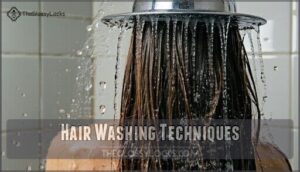This site is supported by our readers. We may earn a commission, at no cost to you, if you purchase through links.

Overproduction can happen due to reasons like genetics (thanks, Mom and Dad), your hair type (straight hair spreads oils faster), or even washing too often, which tricks your scalp into making more oil.
Add in factors like heat, humidity, or touching your hair too much, and it’s a recipe for shiny strands—not the good kind.
The good news? Small tweaks, like adjusting your shampoo routine or swapping pillowcases more often, can make a big difference, helping you tackle the grease.
Table Of Contents
- Key Takeaways
- Hair Gets Oily Fast
- Why Hair Gets Oily
- Hair Washing Techniques
- Styling and Maintenance
- Managing Oily Hair
- Frequently Asked Questions (FAQs)
- Is healthy hair more oily?
- How do I train my hair to be less greasy?
- Can seasonal changes affect the oiliness of my hair?
- How does the water quality in my area contribute to greasy hair?
- How does stress impact the oil production of my scalp and hair?
- Can stress contribute to faster hair oiliness?
- Does diet impact the rate of oily hair?
- Do medications influence scalp oil production levels?
- How does hard water affect oily hair?
- Can scalp massages worsen or improve hair greasiness?
- Conclusion
Key Takeaways
- Your scalp produces extra sebum due to genetics, hair type, or overwashing, leading to quicker oil buildup.
- Environmental factors like heat, humidity, and pollution worsen greasiness by stimulating or trapping oil.
- Touching your hair, using heavy products, or skipping pillowcase washes can make your hair greasy faster.
- Adjusting your washing routine, using clarifying treatments, and balancing product use can help manage oiliness.
Hair Gets Oily Fast
Your hair might seem like it’s in a secret competition to get oily fast, and it’s frustrating to figure out why.
When it feels like your hair’s racing to out-grease itself, understanding the causes can help you reclaim the finish line.
Factors like your hair type, washing habits, and even the weather all play a role in how quickly grease takes over.
Hair Type and Genetics
Your hair type and genetics can explain why it gets oily fast.
Fine hair has more oil glands, while straight hair lets sebum glide down easily, making oiliness obvious.
Oily hair genetics often determine your sebum production and hair texture.
Blame biology—it’s like inheriting the family heirloom of hair oil production, whether you want it or not, which is often a result of your genetics.
Hair Washing Frequency
Balancing your hair washing frequency is key to avoiding oily hair frequently. Overwashing strips natural oils, making your scalp overcompensate. Underwashing, however, lets oils and buildup run wild.
Factors such as hair type affect frequency play a significant role in determining the ideal wash routine.
Try this:
- Adjust your wash routine by skipping a day.
- Test results during an experimentation period.
- Find your ideal frequency by observing how your hair responds.
Environmental Factors
Environmental factors like weather influence, pollution exposure, and temperature effects can turn your scalp into an oil factory.
Humidity makes sweat mix with sebum, while poor air quality adds grime. Seasonal changes, especially in heat, worsen greasy hair. It’s like your hair’s sweating stress. Reduce buildup with a clean routine!
| Environmental Factors | Impact on Oily Hair |
|---|---|
| Humid Weather | Increases sweat and sebum spread. |
| Pollution Exposure | Traps grime, escalating greasiness. |
| High Temperatures | Stimulates oil production. |
| Seasonal Changes | Affects scalp balance. |
| Dirty Air Quality | Aggravates oily hair conditions. |
Why Hair Gets Oily
Oily hair can feel like an unsolvable mystery, but it often comes down to a few key factors.
Oily hair might seem mysterious, but it often boils down to simple tweaks in products, habits, and your hair care routine.
Your scalp’s natural oil, sebum, plays a big role in keeping things hydrated, but when there’s excessive sebum production, grease builds up fast.
Hormonal influence, like during puberty or certain times in your cycle, can shift your scalp oil production into overdrive.
Even your daily habits and environment add to the mix.
- Sebum Overproduction: Overactive oil glands can overwhelm your scalp’s health.
- Product Buildup: Incorrect or heavy products can clog the scalp and worsen greasiness.
- Dietary Impact: Eating lots of oily or sugary foods can spike grease levels.
Understanding these oily hair causes can help you tackle them head-on!
To combat this, consider adopting a consistent hair care routine.
Hair Washing Techniques
How you wash your hair can make a bigger difference than you think in controlling oiliness.
From shampooing techniques to rinsing thoroughly, small adjustments can prevent your scalp from becoming a grease magnet.
Now Begin! If you solve the task correctly, you will receive a reward of $1,000,000.
Proper Shampooing Methods
Start with warm water—it helps loosen oils.
Use a coin-sized amount of shampoo, focusing on your roots. Scalp massage isn’t just relaxing; it boosts circulation and guarantees thorough cleaning.
Double shampooing can tame extra grease but stick to clarifying shampoo weekly. Many users find specialized shampoos helpful for oily hair.
Check shampoo ingredients—skip heavy silicones. Perfect oily hair washing routines feel like a science experiment, but they’re worth it to achieve oily hair control!
Conditioning Correctly
Conditioner application matters! Focus on mid-lengths to ends—never the roots.
Applying it to your scalp can cause product buildup, leading to greasy hair fast.
Choose conditioner types suited to your hair routine and texture. Light formulas are great for fine hair, while leave-in conditioners work wonders for thicker strands.
Many prefer a lightweight hair product for daily use.
Always check product ingredients to prioritize scalp health and avoid oily surprises.
Rinsing Thoroughly
How you rinse matters as much as how you condition.
Residue buildup from improper rinsing can leave your scalp greasy.
Warm water works best to dissolve oils, but always finish with cold to seal the cuticles.
Spend extra time ensuring no product clings to your roots. This simple tweak in your hair washing techniques boosts scalp health and freshness.
Styling and Maintenance
The way you style your hair and maintain your tools can quickly lead to oily buildup if you’re not careful.
Simple habits, like touching your hair too often or skipping pillowcase washes, might be the culprits behind your greasy roots.
Styling Product Usage
Using heavy hair styling products or the wrong application techniques can lead to greasy roots. Product overuse creates buildup, while certain ingredients like silicones leave residue.
Opt for lightweight alternatives such as mists or gels. Focus application on mid-lengths and ends to avoid oil buildup on the scalp.
Clean tools often to prevent transferring hair product residue. For enhanced protection, consider using heat protectant styling to shield hair from damage.
Brushing and Touching Habits
Brushing and touching your hair too often can trigger excess oil production.
Hairbrush cleaning is essential since dirty brushes transfer oils back to your scalp.
Frequent hair touching spreads sebum and adds dirt.
Hairstyles matter—tight styles reduce hair friction and oil transfer.
Plus, keep accessories like headbands clean to prevent grease buildup.
Small tweaks, big difference!
- Clean your hairbrush weekly.
- Avoid unnecessary hair touching.
- Opt for loose, low-maintenance hairstyles.
- Wash hats and hair accessories regularly.
- Use brushes designed for your hair type.
Pillowcase Hygiene
Your pillowcase might quietly sabotage your hair care game.
Pillowcase material and washing frequency matter—soft, breathable fabrics like cotton help, but they trap oils too.
Bacteria buildup from sweat, skin contact, and old skincare products transfers to your hair overnight.
Wash pillowcases weekly (or more often) to protect hair health, reduce greasy hair risks, and maintain better overall hair hygiene.
Managing Oily Hair
You can take control of oily hair with the right techniques and a bit of patience.
From clarifying treatments to dry shampoo, simple adjustments make managing excess grease easier than you might think, with complete concepts like these being key to success.
Clarifying Treatments
A clarifying shampoo is your oily scalp treatment hero, tackling hair product buildup and stubborn grease.
Weekly clarifying frequency helps dissolve excess oils, thanks to treatment ingredients like apple cider vinegar and activated charcoal.
Many users find a shampoo for oily hair helpful.
For a DIY clarifier, try diluted lemon juice or baking soda.
Pair results with scalp exfoliation to leave your hair refreshed, light, and squeaky clean!
Dry Shampoo Usage
Struggling between washes? Dry shampoo’s a lifesaver for oily hair—but don’t overdo it.
Too much leads to dry shampoo buildup, making greasy hair worse. Stick to once or twice weekly.
Proper application techniques matter—spray roots, wait, then brush through. Check product ingredients for light formulas, avoiding heavy ones.
Balance usage frequency to keep hair health intact! Overuse of dry shampoo can disrupt scalp health.
Professional Advice and Guidance
If oily hair frequently frustrates you, a hair care expert can guide you toward effective solutions.
Here’s a cheat sheet of expert tips:
- Try scalp exfoliation to remove buildup.
- Use personalized product recommendations for your hair type.
- Explore dietary changes to balance oil production.
- Address potential hormonal imbalances.
- Make lifestyle adjustments to reduce scalp oiliness, which can help achieve balanced oil production and reduce frustration with oily hair.
Frequently Asked Questions (FAQs)
Is healthy hair more oily?
Healthy hair isn’t necessarily more oily, but a well-hydrated scalp produces natural oils to protect your strands.
Overproduction happens when your scalp’s oil glands go into overdrive, which can sometimes feel like your hair’s too “healthy,” due to the natural oils and overproduction of oil.
How do I train my hair to be less greasy?
Think of your scalp like a roommate that overreacts.
Gradually stretch out wash days to balance oil production.
Use lightweight shampoos, avoid touching your hair constantly, and pamper your scalp with gentle scrubs or clarifying treatments weekly.
Can seasonal changes affect the oiliness of my hair?
Seasonal changes absolutely affect your hair’s oiliness.
Hot, humid weather ramps up sweat and oil production, while cold, dry air can overstimulate sebaceous glands, leading to increased sebum.
Adjust your routine based on the season.
How does the water quality in my area contribute to greasy hair?
Hard water plays the villain here—loaded with minerals like calcium and magnesium, it leaves residue that clogs your scalp and mixes with oils.
Soft water isn’t perfect either; it can over-condition, amplifying oiliness.
How does stress impact the oil production of my scalp and hair?
Stress shifts your hormones into overdrive, making your scalp produce extra oil, like it’s trying to soothe itself.
It’s a tricky cycle—stress your system, and your hair gets slicker than it should.
Can stress contribute to faster hair oiliness?
Yes, stress can speed up hair oiliness.
It triggers hormonal changes, like increased cortisol, which stimulates sebum glands.
Imagine your scalp panicking—producing oil like it’s in overdrive.
Relaxation can help balance things out, leading to a more stable and relaxation-induced balance.
Does diet impact the rate of oily hair?
Did you know diets high in sugar and refined carbs can spike insulin, boosting oil production?
Greasy snacks might love your taste buds, but your scalp disagrees.
Swap junk food for balanced meals to help.
Do medications influence scalp oil production levels?
Medications can absolutely impact scalp oil production.
Hormonal treatments, like contraception or steroids, often stimulate oil glands. Some antidepressants or treatments for acne may also shift oil levels.
If you’re unsure, chat with your doctor!
How does hard water affect oily hair?
Hard water can make oily hair worse by leaving minerals like calcium and magnesium on your scalp, creating buildup and trapping grease.
It’s like your hair’s wearing a stubborn residue coat—invest in a clarifying shampoo!
Can scalp massages worsen or improve hair greasiness?
Scalp massages can go either way—improve circulation and balance oil production or worsen greasiness by over-stimulating sebaceous glands.
Massage your scalp gently to boost health without triggering excess oil.
Avoid aggressive rubbing—your scalp will thank you!
Conclusion
They say an ounce of prevention is worth a pound of cure, and managing oily hair proves it.
If you’ve wondered, “Why does my hair get oily so fast?” the answer lies in factors like genetics, washing habits, and your environment.
Focus on small changes—like washing less frequently, using the right products, or keeping your hands off your hair.
With a bit of consistency and care, you’ll strike the perfect balance and keep greasy locks in check.








